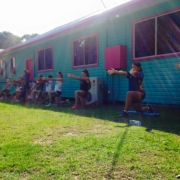A Good Coach Knows.
Benn Harradine, HP’s Founder/Facilitator published a Blog for HMMR Media discussing some interesting points that come with great coaching.
Here is the article:
Being an athlete is not normal. The lifestyle is not normal. The workload is not normal. The stress is also not normal. From the outside looking in things seem so glamorous. Oh how wonderful it must be to travel the world and compete doing what you love and being paid for it. Media attention. People adore you and aspire to be just like you are. The truth is, the outsider really has no idea.
A good coach is on the pulse; they know this. They know everything there is to know about the athletes they are working with. They know this not necessarily by asking questions or by checking loading in their training protocols. They know because they are wise and experienced. There is so much knowledge available. It can be found online, in books, in conversations, on podcasts, videos and seminars. It’s everywhere and its ever growing. What isn’t available is wisdom and experience.
Wisdom and experience help coaches pass long the knowledge to their athletes and help their athletes develop their own values. After all athletes aren’t just made up of their coach’s values; a good coach makes sure that the athletes have their own values, their own mission and their own philosophy. A good coach ensures that all of their athletes are engaged in their own learning. That they are empowered to make choices and informed enough to challenge themselves.
I have had the liberty and privilege of working with some coaches I regard as the best in their field. They have been very unique in many different ways but one factor that is consistent amongst all of them has been their experience of when to push and when to challenge. Pushing and challenging are two key factors in helping athletes develop their own values.
When to Push
In 2008 before I set off to compete in the USA and try and qualify for my first Olympics in Beijing, my coach Gus Puopolo had prepared me very well for long throws. After a good solid base in winter and a steady peak we were getting close to that mark.
After a hard week of technical work and some higher volume of throws I turned up for a session on Sunday morning. Usually we did general athletic training of a Sunday morning and that is what I was expecting this day. It was sunny, no wind and to be honest I was toasted. I felt like I’d had a massive week and just wanted to shut down and run some laps.
Gus screamed at me, “Warm up, you are having a competition! Be ready to throw 66m in 30 mins” My answer was, “NO BLOODY WAY, I’M SO STUFFED” He didn’t even say a word back he just kept setting up for a competition. I was so angry and he knew it!!
That morning I had 6 of the furthest throws of that stage of my career. I threw the Olympic qualifier at least 3 times before leaving for the competitions. He had orchestrated that whole thing. He knew how I was feeling. He knew how I had been training and he knew exactly what to do to get that out of me! At the time I wanted to kill him of course but everything made sense afterwards: in my first competition in the USA I threw the 66 metres and qualified for my first ever Olympics.
What astonishes me is how did he know to take that risk and not risk injury? Given that I was exhausted mentally and physically. How did he know that I would produce that result? That is what over 40 years of coaching experience renders.
When to Challenge
Athletes love to work. It’s what we do. Give us a plan and the majority of us have the discipline to get it done and get it done well. We thrive of the feeling of progress. Little by little we get a day closer to the next level. Some of us have mental battles daily and others need to be challenged by other things, by situations or by other athletes.
My main coach since 2010 has been my father and working with him is fantastic. We have a great bond and he is a born teacher. Has been coaching longer than I can remember and long before I was even born. Dad was never a thrower himself. He used to sprint and play AFL (Australian Football). It’s fair to say that during his younger years Dad has had some hard times and was forced to make things work or bust. He is witty and he watches and listens even when you think he may not be. He pays great attention to the fine fine details and applies the lessons he has learnt from life throwing so many challenges at him.
Working with my father has some great advantages. I am one of his two sons. He knows how I process things, when I need a kick in the ass and when I need to be told to take it easy for a while. He also knows when to challenge me.
There have been times when I have been doing sessions and just grinding myself into small ruts. Dad lets me go on for a while and then he will say something like this (after 4 warm up throws) “That’s enough for today I think. Why don’t we go and do some active recovery and reset for a technical session later in the week” Sometimes I want to respond with, “Yes you are probably right” and am happy to have an easy session, but deep down I know that is not what he wants to hear from me. He is baiting me to respond by completing a session where I focus on the movement. He wants me to simplify and think about flow and connecting with the discus. He wants me to reduce the intensity and train smart. He wants me to make that decision for myself and that is result we get nearly 90% of the time. The problem is I never know when he is going to do it. He is sneaky like that.
Knowing when to challenge is pivotal. It’s a great tool to re-motivate and crush training plateau. But it can also make things worse at the wrong time. When you train on your own you miss these things. The guidance and wisdom of a good coach is essential.
Is it relevant?
At the time these small lessons first occurred I didn’t really pay too much attention. The more my career progresses the more I reflect and understand the important role these lessons played in my development. And, more importantly, the more I appreciate the teams that I had and that I have around me. We all share a common journey: to choose what’s best for the athlete and to understand that learning occurs everywhere.
Coaches are rarely given the credit they deserve. I confess that some of the greatest lessons of life, not just of sport, I have learned from coaches.
A good coach never demands that their methods are the only way. A good coach encourages to own our own journeys and to always question. A good coach is always open-minded. They share knowledge with others and ask for help when they need it. They sift through a great mass of information to arrive at the same question: “Is it relevant?” Then they apply it in ways that some of us don’t even recognise until years later. The best coaches are those that can push or challenge without the athletes even realizing. That is the best way for athletes to develop their own values.













